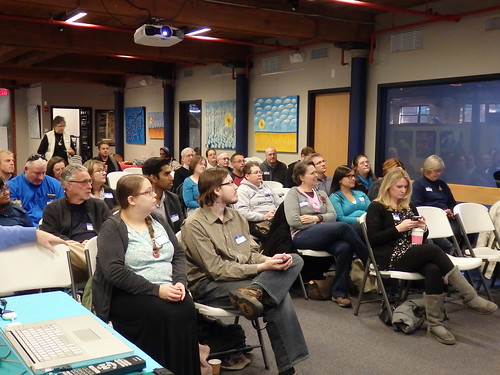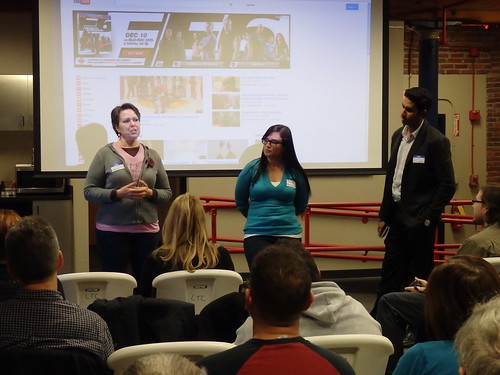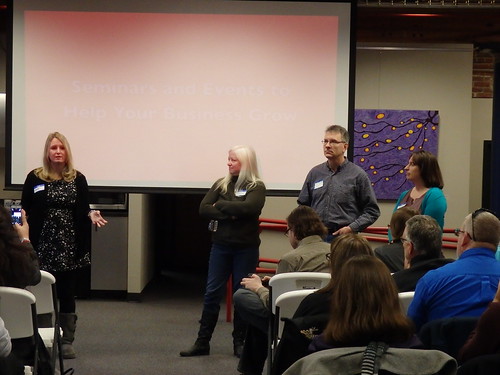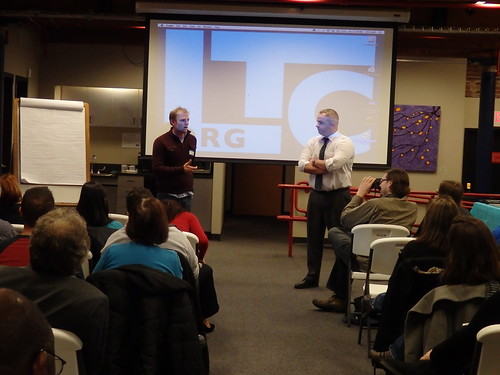Lowell Social Media Conference report

The audience
Thanks to the more than 50 people who attended today’s Lowell Social Media Conference at LTC which was a co-sponsor of the event. Planning has already begun for the Second Annual Lowell Social Media Conference with a target date of the first Saturday in December.
This morning began with a discussion of Twitter and its place in the Lowell blogosphere. Our panelists each brought a different perspective to their remarks. Emil Kuruvilla who is with the Merrimack Valley Sandbox uses it exclusively for work; Yovani Baez tweets about her personal interests and experiences rather than about work; and Liz Smith, an artist with a studio at Western Ave who also lives downtown, uses both for personal and business purposes. All urged us to use it for two-way communications, meaning between you and others on Twitter, and not just one-way, meaning from you to the rest of the world. Liz said that such one way behavior would be like putting some of your own pronouncements onto a tape recorder and then having the tape recorder show up to a discussion. The tape recorder could not respond to what others are saying and the “conversation” would be pretty dull. Emil said that a good practice was to always include a link to a website in a Tweet to give readers “someplace to go.” Audience members had many questions of the panelists. It was clear that people are intrigued by Twitter and may be familiar with its basics, like how to do a Tweet, but are unfamiliar with some of the more advanced features and techniques like search, hashtags, replies and lists. We will certainly revisit this topic.
The second panel of the day talked about short-form video. Our contributors here were Danielle McFadden, Caroline Gallagher, Phil Lupsievicz, and Jessica Wilson. All agreed that there’s more to video than simply pointing a camera and pressing the record button, but all urged everyone to start with the basics: be sure your audio is good and don’t make it a hostage video (my term) with the subject against a stark wall. Pick a good background. Also when interviewing someone on video, ask your question and keep quiet – don’t interject “ah ha” or “yes” in the middle of the subject’s audio. But by all means, make a video and once you do, load it up to YouTube and share it across all social media platforms. And if you need some help, by all means go to LTC (membership for as little as $30 per year). Not only can you get some excellent training there, but you can also find collaborators to assist you in your projects.
The third panel of the day was the role played by social media in the recent city election. Our two main speakers were Dan Rourke and Derek Mitchell who were both candidates. Both used social media extensively but stressed it is no substitute for the hard work of direct contact with voters. But it is a great supplement to that, especially for “building your brand” and for recruiting and motivating volunteers. Their comments were amplified by Lowell School Committee members Kristin Ross-Sitcawich and Kim Scott who were also in attendance.
The final portion of the event was an audience-wide discussion of how to get people more active in the Lowell community. It’s a challenge but it’s important to be persistent. I served as moderator throughout the conference and so I was unable to take many notes. Hopefully others who attended can supplement this report by adding their own recollections of what was said in the “comments” section. Thanks again to all who participated. We’ll do this again next December, but we shouldn’t wait that long to reconvene those who attended today plus the many others who would have liked to have been there but had scheduling conflicts. Suggestions for similar events are always welcome.

Twitter – Liz Smith, Yovani Baez, Emil Kuruvilla

Video – Danielle McFadden, Caroline Gallagher, Phil Lupsiewicz, Jessica Wilson

Politics – Derek Mitchell, Dan Rourke
The day after our recent election it became clear to anyone paying attention that social media is a great tool for name recognition and for fundraising but it had a minimal impact on actual votes. Of the nine winning candidates can anyone name three that used social media to win? Hell can we even name one ? Social media should be a powerful tool in our city elections but it doesn’t appear that anyone has been able to weaponize it yet.
Dan Rourke did use social media extensively and well but as he himself acknowledged, he came to the election with a lot of other assets such as name recognition, an active life in Lowell, a big family. Plus from my observations, I don’t think anyone started knocking on doors earlier or knocked on more than Dan.
But beyond Dan, I’m not sure who of the winning council candidates used social media very effectively. That’s partly a function of the demographics of the 11,500 citizens who voted in this election, something that will be the subject of some blog posts in the coming weeks. I think most would agree that the universe of voters in the city election and the universe of readers of the local newspaper had a big overlap. But I suspect that the well-informed 25 year old of today who has never even touched a paper newspaper won’t suddenly start doing that at age 55 so as people who have grown up with social media eventually come to dominate the electorate, social media will be more important in campaigns. The only question is how fast will that happen.
Obviously from reading your site I know that you have a love for politics. Part of that love is looking at results and asking what went right and what went wrong with certain candidates or issues. The double the vote campaign was a great idea that ended up working in most of the city besides belvidere( impossible to double 80% turnout). The thinking was that If the turnout was close to 12k then it would be great news for some of the newer first time candidates and bad for the more established names. But the results were were almost opposite what the “experts” thought they would be. This leads me to the social media head scratcher. I honestly thought it would have a bigger impact on the election but maybe it did and myself and others were simply looking in the wrong direction. Lowell has over 100k residents but in many ways it still has a tight knit feel to it. Maybe Dan Rourke did win the social media battle. It wasn’t because of grand statements or because of a loyal following. Maybe it was simply facebook turning friends of friends into voters. Maybe Rourkes family and name took a close knit city and shrunk it down even more?
You’re right about the pre-election thinking that a bump up in turnout to 12K would help some of the new comers and it may have, but not enough to overcome some other factors. The detailed list of who voted in the election is now available. That will yield some interesting evidence about who voted and many other things. Watch for a series of blog posts on that topic in the coming weeks.